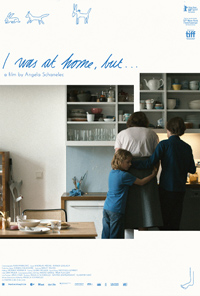The Play’s the Thing: Schanelec Shines with Striking Dynamic on Artifice vs. Authenticity
 Words pour out of us, as the main character vocalizes in one of several tirades in Angela Schanelec’s latest art-house masterwork, I Was at Home, But. Yet often these words are interpreted or understood differently by each one of us. Communication and perspective are some of the underlying themes linking the various scenarios of Schanelec’s latest mysterious tapestry, which threads together pieces of a visual puzzle, the meaning or depth of which are not often felt until afterwards.
Words pour out of us, as the main character vocalizes in one of several tirades in Angela Schanelec’s latest art-house masterwork, I Was at Home, But. Yet often these words are interpreted or understood differently by each one of us. Communication and perspective are some of the underlying themes linking the various scenarios of Schanelec’s latest mysterious tapestry, which threads together pieces of a visual puzzle, the meaning or depth of which are not often felt until afterwards.
A lovely think piece which centers on a family attempting to reconfigure itself, Schanelec plays with ideas of artificiality vs. authenticity both as a narrative subject and diegetic texture, juxtaposing an elementary school production of Hamlet with the banalities of communication both in professional personas and intimate expectations. Flashes of impassioned exchanges intersperse the tranquil movements of a film which explores the idea of life cycles, and the innate need to return to the places from which we’ve come to start anew.
Astrid (Maren Eggert) has quite unexpectedly come adrift from herself. After the return of her thirteen-year-old Philip, who disappeared mysteriously for a week (perhaps in response to the recent death of his father), she finds she may not know how to communicate with her children any longer, particularly her son, who with his recent actions has exhibited autonomy. Her ideas about her job and the world around her have also begun to change drastically, as exhibited by some anxiety-laden harangues with others.
More linear than Schanelec’s last feature, the surreal The Dreamed Path (2016), on a superficial level, I Was at Home, But could be mistaken for esoteric banality. We casually observe Maren Eggert’s Astrid as she deals with the return of Philip for reason unexplained, which leads to hospitalization for sepsis. Initially, she’s more concerned with acquiring a second-hand bicycle from a man who speaks through an artificial voice-box. Eventually, the bike degrades, forcing her to return it to the original owner, claiming it’s junk. This seems to be more of the major catalyst which sparks Astrid’s emotional unravelling, leading to a rambling monologue with school staff who have been trying to come to a decision about how to handle Philip (though the specifics of this aren’t made entirely clear).
Slowly, Schanelec provides us with the key to understanding Astrid and the nature of the film itself through these continued exchanges, including the film’s most vibrant burst of energy during a complex conversation with a man we come to understand has applied for a professorship. Small talk leads to her negative opinion of a film he directed, of which she only watched part of, but consisted of a ballet dancer acting alongside a non-professional woman dying from a terminal illness. Through her review of the film, we come to understand some of Astrid’s current frustration, as well as the film’s main thrust—all of us have different interpretations of the world around us informed by personal experiences. The exchange is brilliantly played by Eggert, followed by another outburst with her children over breakfast.
Astrid’s reactions to her environment provides the template where things starts to take shape in, I Was at Home, But, further informed by lengthy passages of schoolchildren performing Hamlet in what might be the most monotonous staging of the famed play. Of course, the subtext of the brooding Danish king is also one of perspective, a man driven to madness and murder because his father’s ghost visits him to inform him of his uncle’s treachery and his mother’s potential involvement—but is Hamlet a reliable narrator? When the bike owner calls Astrid to schedule the return of the bike, her boyfriend overhears the man, assuming something is wrong with her phone. Astrid’s choice of words (demanding her money back and calling the bike ‘junk,’ for which she later apologizes) and world view are mirrored in the tangential subplot involving Franz Rogowski’s teacher, also in a troubled relationship with his girlfriend, who discuss trajectories and emotions, each on opposing ends on predictions of a future and what constitutes love.
And as Schanelec’s prose promises, I Was at Home, But returns from whence it came, to Mother Nature in a cycle of degradation, with the promise of rebirth. Masterful in its subtlety, Schanelec once again proves her expert vision using unexpectedly simple parameters in complex ways.
Reviewed on February 12th at the 2019 Berlin International Film Festival – Competition. 105 Mins.
★★★★/☆☆☆☆☆


